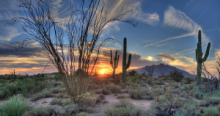Article
In 1912, Arizona became the 48th and last contiguous state to join the United States. The capital, Phoenix, became one of the fastest growing cities in the country after the invention of air conditioning occurred in the 1950s. Nicknamed the "Grand Canyon State," Arizona is home to Grand Canyon National Park. Bordered by California and Nevada to the west, Utah to the north, New Mexico to the east, and the country of Mexico to the south, Arizona occupies the central portion of the Southwestern region of the United States.
Arizona is also the state with the most land designated to Native American nations. The state is home to 22 distinct tribes, the largest group being the Navajo, whose reservation extends into Utah and New Mexico and contains many of its own attractions including Canyon de Chelly National Monument, Navajo Nation Window Rock Monument & Veterans Memorial Park, Rainbow Natural Bridge, and Chaco Cultural National Historical Park.
"Arizona sunset, November 4, 2007" by Jason Corneveaux is licensed under CC BY-NC-ND.
Manuscripts
A04 Dance Hall of the Dead (04-06) p. 44
A04 Dance Hall of the Dead (04-06) p. 79
A04 Dance Hall of the Dead (04-06) p. 91
References
Bailey, Garrick Alan and Roberta Glenn Bailey
1986 A History of the Navajos: The Reservation Years. Santa Fe: School of American
Research Press.
Jacoby, Karl
2008 Shadows at Dawn: A Borderlands Massacre and the Violence of History. New York:
Penguin Press, 2008.
Nickens, Paul R., Kathleen Nickens, and the Arizona Historical Foundation
2007 Native Americans of Arizona. Charleston: Arcadia Publishers.
Powell, Lawrence
1976 Arizona: A Bicentennial History. New York: Norton.

